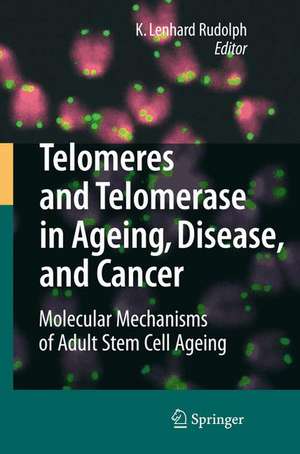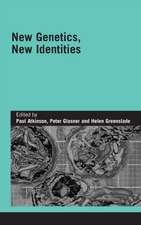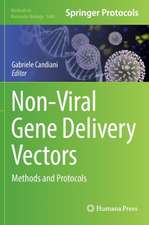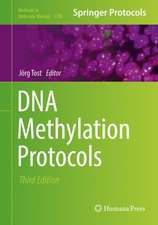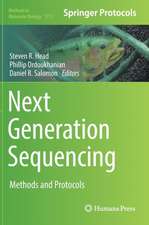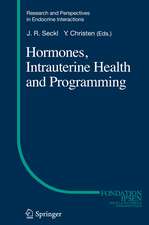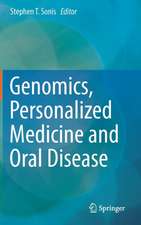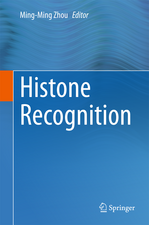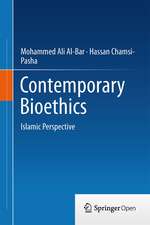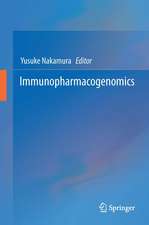Telomeres and Telomerase in Aging, Disease, and Cancer: Molecular Mechanisms of Adult Stem Cell Ageing
Editat de K. Lenhard Rudolphen Limba Engleză Hardback – 7 noi 2007
| Toate formatele și edițiile | Preț | Express |
|---|---|---|
| Paperback (1) | 1300.90 lei 39-44 zile | |
| Springer Berlin, Heidelberg – 18 oct 2010 | 1300.90 lei 39-44 zile | |
| Hardback (1) | 1423.95 lei 6-8 săpt. | |
| Springer Berlin, Heidelberg – 7 noi 2007 | 1423.95 lei 6-8 săpt. |
Preț: 1423.95 lei
Preț vechi: 1498.90 lei
-5% Nou
Puncte Express: 2136
Preț estimativ în valută:
272.54€ • 283.46$ • 228.39£
272.54€ • 283.46$ • 228.39£
Carte tipărită la comandă
Livrare economică 13-27 martie
Preluare comenzi: 021 569.72.76
Specificații
ISBN-13: 9783540737087
ISBN-10: 3540737081
Pagini: 344
Ilustrații: XIV, 330 p. 64 illus., 25 illus. in color.
Dimensiuni: 178 x 254 x 27 mm
Greutate: 0.77 kg
Ediția:2008
Editura: Springer Berlin, Heidelberg
Colecția Springer
Locul publicării:Berlin, Heidelberg, Germany
ISBN-10: 3540737081
Pagini: 344
Ilustrații: XIV, 330 p. 64 illus., 25 illus. in color.
Dimensiuni: 178 x 254 x 27 mm
Greutate: 0.77 kg
Ediția:2008
Editura: Springer Berlin, Heidelberg
Colecția Springer
Locul publicării:Berlin, Heidelberg, Germany
Public țintă
ResearchDescriere
Twenty-five years after the disclosure of the telomeric DNA sequence and 22 years after the discovery of telomerase, it has become clear that telomeres and telomerase influence disease of human ageing including cancer. This book summarizes our current knowledge on the role of telomeres and telomerase in ageing, regeneration, and cancer with a special focus on ageing stem cells. Moreover, the book reviews current ef forts to target telomeres and telomerase for anticancer treatment or reg- erative therapies. 1. 1 Ageing The molecular analysis of ageing is an emerging research field that will have great impact on patients care, lifestyle, and on disease prevention in the human population worldwide. Major molecular mechanisms that influence the ageing process include (1) the accumulation of molecular damage affecting DNA and p- teins, (2) alterations in gene expression, including alterations in checkpoint responses, metabolic pathways, and developmental pathways, and (3) the decline in adult stem cell function. All these mechanisms lead to a decrease in organ main- nance and function, thus representing a major factor limiting the quality of life d- ing ageing. Moreover, the accumulation of molecular damage increases genetic alterations and the cancer risk during ageing. Indeed, increased age is the leading cause of cancer. Understanding the molecular basis of ageing will ultimately point to targets for novel therapies aiming to improve the function of cells and organs in the ageing organism, thus allowing increased vitality or what we think of as “healthy ageing.
Cuprins
Telomere Shortening and Ageing.- Cellular versus Organismal Aging.- Telomere-Induced Senescence of Primary Cells.- Telomeres, Senescence, Oxidative Stress, and Heterogeneity.- Initiation of Genomic Instability, Cellular Senescence, and Organismal Aging by Dysfunctional Telomeres.- Telomerase Mutations and Premature Ageing in Humans.- Telomerase, Telomeres, and Stem Cell Aging.- Mechanisms of Stem Cell Ageing.- Senescence Signatures of Human Hematopoietic Stem Cells.- Telomere Shortening Induces Cell Intrinsic Checkpoints and Environmental Alterations Limiting Adult Stem Cell Function.- p16INK4a and Stem Cell Ageing: A Telomere-Independent Process?.- Telomerase as a Potential Regulator of Tissue Progenitor Cells.- Telomeres, DNA Damage and Cancer.- Telomere Shortening and Telomerase Activation during Cancer Formation.- Telomere Binding Proteins and Disease.- Therapeutic Targets.- Targeting Telomerase: Therapeutic Options for Cancer Treatment.- Werner Syndrome, Telomeres, and Stress Signaling: Implications for Future Therapies?.
Textul de pe ultima copertă
The understanding of the molecular mechanisms underlying the ageing process is essential to improve quality of life and ‘health span’ in the growing populations of the elderly.
Telomere shortening represents one of the basic aspects of ageing and telomere dysfunction could contribute to the accumulation of DNA damage during ageing. This book summarizes experimental evidence and clinical data indicating that telomere dysfunction influences human ageing, diseases and cancer. In addition, the book describes our current knowledge on checkpoints that limit cellular lifespan (senescence) and survival (apoptosis, crisis) in response to telomere dysfunction.
A special focus of the book is on adult stem cells. There is emerging evidence that adult stem cell ageing impairs organismal fitness and survival and contributes to cancer formation (cancer stem cells). The book summarizes basic mechanisms of adult stem cell ageing. Moreover, the authors describe evidence that telomere dysfunction impairs stem cell function by inducing cell intrinsic checkpoints as well as environmental alterations.
All of these subjects are of great interest for ageing researchers, physicians and students and should provide a rational basis for beginning to identify molecular targets for novel therapies that aim to improve quality of life during ageing.
Telomere shortening represents one of the basic aspects of ageing and telomere dysfunction could contribute to the accumulation of DNA damage during ageing. This book summarizes experimental evidence and clinical data indicating that telomere dysfunction influences human ageing, diseases and cancer. In addition, the book describes our current knowledge on checkpoints that limit cellular lifespan (senescence) and survival (apoptosis, crisis) in response to telomere dysfunction.
A special focus of the book is on adult stem cells. There is emerging evidence that adult stem cell ageing impairs organismal fitness and survival and contributes to cancer formation (cancer stem cells). The book summarizes basic mechanisms of adult stem cell ageing. Moreover, the authors describe evidence that telomere dysfunction impairs stem cell function by inducing cell intrinsic checkpoints as well as environmental alterations.
All of these subjects are of great interest for ageing researchers, physicians and students and should provide a rational basis for beginning to identify molecular targets for novel therapies that aim to improve quality of life during ageing.
Caracteristici
Provides an in depth review of our current knowledge on the role of telomeres and telomerase in ageing, disease and cancer
Special focus is on adult stem cells
Describes future directions in research on adult stem cell ageing, telomeres, and cancer
Excellent basis for academic teachers, scientists, and students interested in the areas of stem cell ageing, telomeres and telomerase, regeneration, and cancer
Interesting for physicians since the development of molecular therapies targeting ageing stem cells represents a promising approach to improve regenerative reserve and organ function during ageing and could also serve to target cancer stem cells
Includes supplementary material: sn.pub/extras
Special focus is on adult stem cells
Describes future directions in research on adult stem cell ageing, telomeres, and cancer
Excellent basis for academic teachers, scientists, and students interested in the areas of stem cell ageing, telomeres and telomerase, regeneration, and cancer
Interesting for physicians since the development of molecular therapies targeting ageing stem cells represents a promising approach to improve regenerative reserve and organ function during ageing and could also serve to target cancer stem cells
Includes supplementary material: sn.pub/extras
